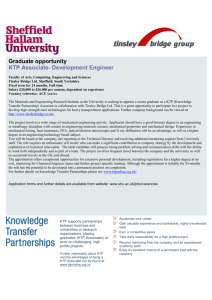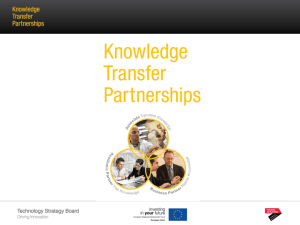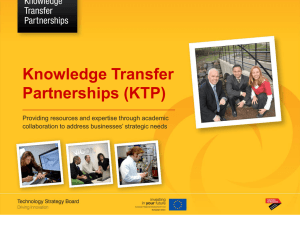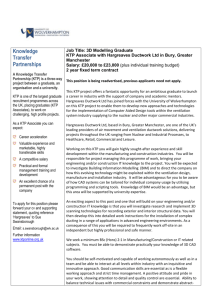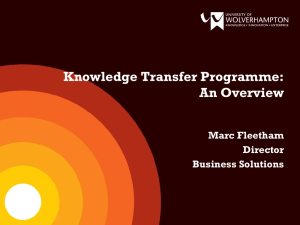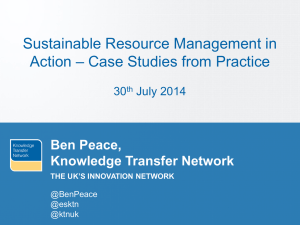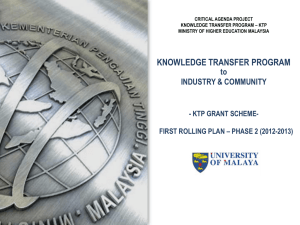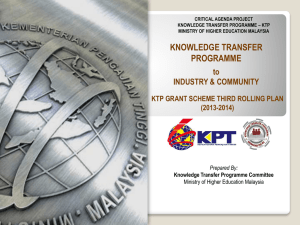KTP Workshop Presentation - Insight – University of Gloucestershire
advertisement
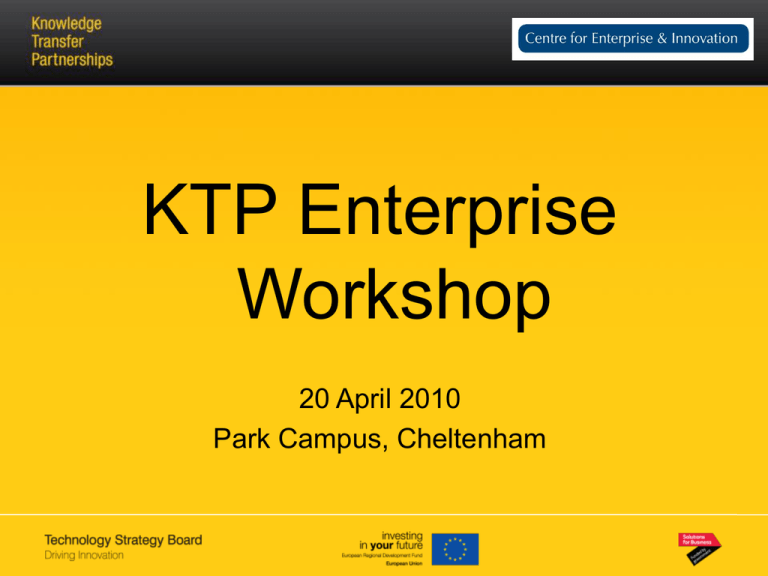
KTP Enterprise Workshop 20 April 2010 Park Campus, Cheltenham KTP Enterprise Workshop Part of a series of Internal Enterprise Workshops, organised by the CEI to help support enterprise activity at the University • • • • Enterprise Evening – Nov 2009 Short Course Enterprise Workshop – Feb 2010 KTP Enterprise Workshop – April 2010 Sustainability & Enterprise Workshop – June 2010 KTP Enterprise Workshop Knowledge Escalator • A regional programme helping raise enterprising capabilities within Universities • Funding provided by SWRDA and ERDF and runs until Sept 2011 • Support for a portfolio of activities – Enterprise support for staff (e.g. Enterprise Change Academy, Enterprise Workshops, NEDs, Knowledge Fellowships) – Enterprise support for students (e.g. Employer Mentoring, BUG, Glos Entrepreneurs) – Innovation support for staff and students (e.g. USWEA, Proof of Concept) – Regional engagement The Knowledge Escalator Project is part financed by the European Union’s ERDF Competitiveness and Employment Programme 2007-13 securing £1,833,000 of ERDF investment through the South West Regional Development Agency (SWRDA). Live Partnerships This Afternoon’s Workshop: 3.30pm • KTP Overview • KTP @ UoG • KTP Support • Q&A 5.00pm Dr Gillian Rysiecki Dr Martin Wynn Collette Coll Dr Gillian Rysiecki KTP Adviser Facilitating Innovation Through Collaboration KTP Mission Knowledge Transfer Partnerships is Europe’s leading programme helping businesses to improve their competitiveness, productivity and performance through the better use of knowledge, technology and skills that reside within the UK knowledge base. History 1975 Launched as Teaching Companies Scheme (TCS) 2003 Knowledge Transfer Partnerships replaced TCS and Colleges & Businesses Partnership scheme (CBP) 2007 Transferred from the Department of Trade and Industry (DTI) to the Technology Strategy Board Funding Organisations Funded by the Technology Strategy Board with 21 other funding organisations: March 2009 £35m £87m Grants committed Company contributions 977 1021 Live partnerships Live projects (includes classic and shorter KTPs) (includes classic and shorter KTPs) Number of Live partnerships Live Partnerships £m committed per year £m committed per year Partnership Structure Business Partners • Stable companies of all sizes from all industrial sectors • Charities and not-for-profit organisations • Education institutions (LEAs and schools) • Health organisations (hospitals and NHS Trusts) Knowledge Base Partners • Higher Education Institutions • Further Education Institutions • Research and Technology Organisations • Public Sector Research Institutes The Associate Recently Qualified with: • First degree ~ 76% hold 1st or 2(i) • Higher degree ~ 56% • NVQ level 3 • Average age 29 years • All disciplines The Features: classic KTP Project length 1-3 years Associates recruited by KB and Business partners Employed by KB partner Project located at business premises with company supervisor KB Supervisor spends ~ half day per week at company premises The Features: shorter KTP Project length 10-40 weeks Tackling shorter-term, more tactical issues Employed by KB partner and works at business premises or can be based at the KB if already employed by the business partners Partnerships may have more than one 10-40 week KTP running in parallel or sequentially Supervision ~ half day per week working within the project Project Criteria Strategic relevance to the business Stimulating and challenging for the academic team Intellectually challenging for Associate Sound business case Clear knowledge transfer Clear additionality Benefits likely to accrue Project Budget FEC effective from 1 January 2006 Available to HEIs and RTOs Annual budget ~£60k Includes T&S, consumables and training Equipment owned by KB Partner on completion SMEs contribute 33% Large companies contribute 50% Business Benefits Long-term, strategic relationship with KB partner Recruitment Transfer of Embedding of the ‘right’ people knowledge/ expertise of innovation culture Business Benefits Benefits per Associate project: Increase in annual profit before tax ~ £270,000k Investment in plant and machinery ~ £165,905k New jobs created 3 Company staff trained 14 New research projects initiated 3 Commercial benefits from application of IP ~26% Knowledge Base Benefits • Income • Published papers • Teaching materials, case studies and projects (88%) • New research themes – commercial relevance (87%) • Staff development – commercial awareness (92%) • Higher degree registrations • Graduate career opportunities • Exploitation of IP developed during project (26% expect commercial benefits) • Strategic relationship with company (81%) Associate Benefits • Part of one of the country’s largest graduate recruitment schemes • Competitive salary • Employment within chosen academic discipline • Fast-track career development • Opportunity to register for higher degree during project • 73% of Associates offered employment by host business • Training and development with qualification in Management to National Standard Size of Enterprise >250 Employees (25%) 50-249 Employees (29%) <10 Employees (9%) 10-49 Employees (37%) Top 25 KB Partners KTPs by Academic Department Design (7%) Other (8%) Engineering (36%) Sciences (15%) Computing (17%) Management (18%) RAE Rating of Department <3 (6%) 5&5* (33%) 4 (24%) 3 (33%) www.ktponline.org.uk KTPs at the University of Gloucestershire Effecting successful knowledge transfer KTPs at the UoG Since 2003, UoG has undertaken 44 KTP projects 29 have been related to information systems or software development 10 were based on new sales and marketing developments 4 focused on new product development 1 delivered general efficiency improvements in a local authority KTPs at the UoG Of the 44 projects: • 40 have been with SMEs and • 4 with large organisations (2 public sector, 2 private sector) SMEs have come from many industry sectors: • • • • • • • • • • • • software houses construction companies office supplies company assembly and distribution (for equipment for disabled) pharmaceuticals packaging contract packaging environmental services landscape architects project management services electronic funds collection agricultural feeds manufacture roof component manufacture KTP – What do we need to do to be successful? SELLING the product DESIGNING the project SUPERVISING the relationship KTP – What do we need to do to be successful? SELLING the product DESIGNING the project SUPERVISING the relationship Selling the product – HOW? COLD CALL – 11% TPG DisableAids, Allpay, Zintec, AgriLloyd1, Muddy Boots PERSONAL/INDUSTRY CONTACT – 15% Brecon Pharms, Union Square, BBI, QEB, Applied Energy, AuraQ, Westley1 EVENTS, MARKETING, CONFERENCES – 40% Pegasus, Fixing Point, Beaumont, IAS, Illman-Young, SKF, Optimum, Matchriver, Glos CC, Contrapac, Building Solutions, C&G Services, Energist1, Allcoopers, AGD, Triangle, Randall & Payne, Dowty FOLLOW- ON PROJECTS – 24% Brecon Pharms2, TPG 2&3, Agri-Lloyd 2&3, Optimum2, Energist2, Building Solns2, CSDM2&3 KTP selling - guidelines Develop in depth product knowledge Know the KTP products backward Target the right profile of company/pick the winners Rapidly growing profitable SMEs are ideal Develop different routes to market & ways of selling Target appropriate networking events, conference presentations, newspaper opportunities, student placement links, part-time student opportunities Explore company business plan to unearth KTP opportunities What does the company need staff to do over the next few years? Could a KTP be the answer? Customise the KTP product offering Position KTP benefits and your sales proposition depending on company context and requirements KTP – What do we need to do to be successful? SELLING the product DESIGNING the project SUPERVISING the relationship Project design – what you have to cover • Overall project aim and objectives • Deliverables and profit enhancement for the company partner • Benefits for the university and Associate • 2 year work plan, broken into 6 or 7 sections, detailed to task level • Project plan Gantt chart • Project budget and commitments • Supervisor track record and capabilities • Link it all together – the ‘golden thread’ Project design guidelines Establish the nature of the project in outline with the company partner Take the lead as regards filling in the application forms If you leave too much to the company or the academic, momentum can be lost Develop a good working relationship with the KTP Adviser Identify the company financial profile early on There can be problems with company financial profile – better to find out early Focus on the work plan and project deliverables – follow the ‘golden thread’ Take the lead in attempting to quantify benefits KTP – What do we need to do to be successful? SELLING the product DESIGNING the project SUPERVISING the relationship Project supervision – main elements • The project ‘academic supervisor’ gets 0.1 on BOD • Weekly monitoring and control meetings at company and 4-monthly Local Management Committee meetings with KTP Adviser and company personnel • Responsible for monitoring overall budget and authoring final report. Should be involved from interview stage onwards • Experience and documentation from a two year project will provide materials for teaching, conference papers and publications. • There is also a project ‘academic lead’ role that gets circa 20 hours on BOD – a back-stop, there for guidance and advice Project supervision guidelines Take ownership and make sure the project delivers To a degree, you will need to manage the relationship, the Associate and the project. Project management and quality assurance skills are often required. Set up a weekly control group, and insist on weekly minuted meetings If you lose a shared understanding of what is going on, risk of project failure increases Develop an ‘esprit de corps’ with the Associate and line manager Develop a team spirit focused on project delivery Add value beyond the project scope; act as an account manager as well Look for a second KTP or other business opportunities in the company Never give up, be patient – always try to find a way forward KTP PROJECT LEADTIME Minimum elapsed time for project approval: 4 months SUPERVISION APPOINTMENT & START IDENTIFY CLIENT PROJECT SELLING DEVELOP DETAILED KTP PROPOSAL KTP PROJECT AUTHORISATION PROCESS PROJECT DESIGN SUBMISSION & APPROVAL ADVERTISEMENT & INTERVIEW • Summary • 44 projects completed or underway • £4.5m revenue earned. ‘Real money’ contribution of over £500K • 20 academic supervisors used • Associates from 12 different countries • Wide range of research publications, conference presentations and teaching materials Improving UoG credibilty with local businesses, Enhancing academics’ experience, Generating research opportunities and teaching materials, Helping move businesses forward, Supporting Associates’ career development, Producing innovative thinking www.glos.ac.uk KTP Support Office KTP Project Support Office • Collette Coll – Business Account Manager/KTP Manager • Caroline Monk – KTP Project Officer • Laura Crabb – Head of CEI At What Stages Can we Support You? • The Business Account/KTP Management Team supports from initial company enquiry/lead through to project proposal submission and confirmation • The Project Officer supports from initial planning and submission, throughout the life cycle of the programme, to post project review How Can We Support You? Business Account / KTP Management Team: • Co-ordinate and attend initial company meetings • Assist and co-ordinate completion of relevant proformae by Academic(s) and Company Partner • Assist and co-ordinate proposal submission to funding body • Liaise with funding body representatives to confirm approval • Liaise with KTP Project Office to manage communications loop for all parties • Maintain client relationships where appropriate How Can We Support You? KTP Project Office: Pre –approval stage: Assist with PIMS Supply Standard data for proposal Submission of proposal documents Co-ordination of communciations Post Approval: Co-ordinate recruitment Manage the meetings programme throughout project Manage all budgets, Troubleshoot and general enquiries Completion: Co-ordinate standard end of project activities Case Study report Contact us CEI /KTP Team • T: 01242 714104 E: cei@glos.ac.uk w: http:www.glos.ac.uk/businessandpartnerships/cei/pages/what.aspx// KTP Contacts: Collette Coll T:01242 714104 E:ccoll@glos.ac.uk Caroline Monk T:01242 714113 E:cmonk@glos.ac.uk Laura Crabb T:01242 714146 E:lcrabb@glos.ac.uk Questions? Thank you
